
-
Find the right food for your petTake this quiz to see which food may be the best for your furry friend.Find the right food for your petTake this quiz to see which food may be the best for your furry friend.Featured products
 Sensitive Stomach & Skin, assortiment de conserves
Sensitive Stomach & Skin, assortiment de conservesHill's Science Diet Sensitive Stomach & Skin Variety Pack
Shop Now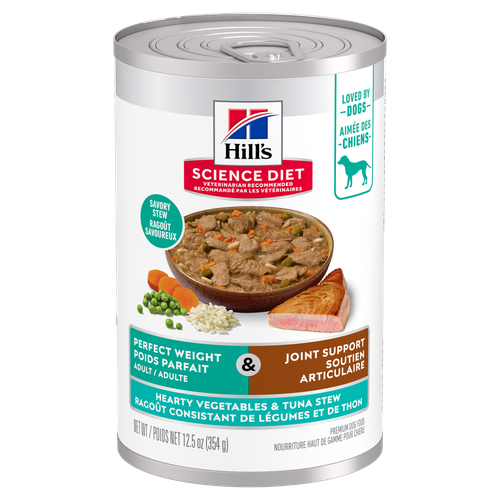 Adult Perfect Weight & Joint Support Hearty Vegetables and Tuna Stew Dog FoodShop Now
Adult Perfect Weight & Joint Support Hearty Vegetables and Tuna Stew Dog FoodShop Now Healthy Cuisine, Adulte, assortiment de conserves
Healthy Cuisine, Adulte, assortiment de conservesHill's Science Diet Healthy Cuisine Variety Pack
Shop NowFeatured products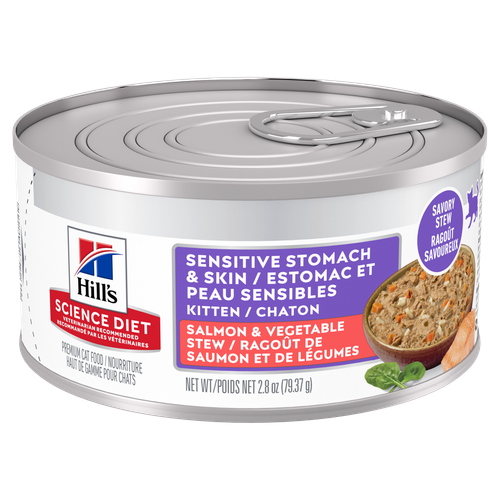 Kitten Sensitive Stomach & Skin Salmon & Vegetable Stew
Kitten Sensitive Stomach & Skin Salmon & Vegetable StewSupports kitten growth, digestive health, nourishes skin and promotes a lustrous fur
Shop Now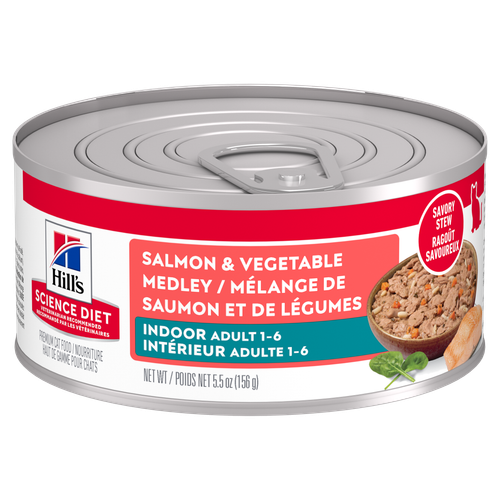 Adult Indoor Salmon & Vegetable Medley Cat Food
Adult Indoor Salmon & Vegetable Medley Cat FoodPrecisely balanced nutrition for indoor cats with the delicious taste of savory salmon and vegetables
Shop Now Adult Urinary Hairball Control Savory Chicken Entrée cat food
Adult Urinary Hairball Control Savory Chicken Entrée cat foodSupports the health of the whole urinary system with optimal levels of magnesium
Shop Now -
Dog
- Dog Tips & Articles
-
Health Category
- Weight
- Food & Environmental Sensitivities
- Urinary
- Digestive
- Joint
- Kidney
- Dental
- Cancer
-
Life Stage
- Puppy Nutrition
- Adult Nutrition
- Senior Nutrition
Cat- Cat Tips & Articles
-
Health Category
- Weight
- Skin & Food Sensitivities
- Urinary
- Digestive
- Kidney
- Dental
- Stress
- Cancer
-
Life Stage
- Kitten Nutrition
- Adult Nutrition
Featured articles Pet Food Storage Tips
Pet Food Storage TipsDiscover how and where to store your dry, as well as canned, dog and cat food. Learn how to find the "best before" dates on all Hill's pet food packaging.
Read More The Incredible Science Behind Your Pet's Microbiome
The Incredible Science Behind Your Pet's MicrobiomeLearn what a pet's microbiome is, how it contributes to your pet's gut & overall health, and why nutrition is important in maintaining healthy microbiomes.
Read More Compare Your Pet Food's Calories to Other Brands
Compare Your Pet Food's Calories to Other BrandsCompare Hill's Science Diet dog and cat food's calories against other pet food brands and AAFCO recommended maximum calorie count.
Read More -


You just noticed that your pet has some spotting on their body, and your veterinarian informed you that it's from vitiligo. But what is vitiligo in dogs and cats? Here are all the basics.
What Is Vitiligo in Dogs & Cats?
Vitiligo is a rare skin condition that some humans may develop, but so can cats and dogs. A human or animal with this condition experiences depigmentation, which occurs when the skin loses its natural pigments. The skin will turn white (or light pink) in patches and hair in those spots can also turn white.
Tri-County Animal Hospital in Wayne, New Jersey reported that vitiligo is a "condition characterized by symmetrical lack of pigment in the skin and white hair coat, especially involving the face and nose."
What Causes Vitiligo?
Is vitiligo something that can be "caught" from another animal with the condition? Simply stated, no. Austin Veterinary Emergency & Specialty (AVES) confirms that vitiligo is not contagious. However, this condition is often hereditary, so if a previous generation experienced depigmentation, your cat or dog is more likely to develop this uncommon skin condition. It's not clear why vitiligo occurs, but it's believed that it happens when something interferes with the body's melanin-producing cells.
Are Some Cats and Dogs More Likely to Get It?
If you're worried that your dog or cat might develop vitiligo, don't be too concerned, especially if you haven't noticed any white skin or hair spots. This skin condition is quite rare, though there are some breeds that are more likely to get it than others.
Tri-County Animal Hospital noted that vitiligo is common in dog breeds such as "Belgian Tervuren, German shepherd dogs, Doberman pinschers, rottweilers, German shorthaired pointer, Old English sheepdog, and dachshunds." Siamese cats may be predisposed as well.


Tasty Tips
Young pets may need several visits in their first year for vaccinations. Adult pets generally benefit from annual check-ups, while senior or special-needs pets might require more frequent visits.
Should You Be Worried About Depigmentation?
If you know your pet's bloodline and there haven't been any other cases of vitiligo in previous generations, you don't need to worry. However, pet parents who don't know their animal's family history of skin conditions might want to point out any of their pet's skin changes to their vet.
Since most cases of vitiligo in dogs and cats occur when they're young, depigmentation at an older age may require a visit to the vet. It may be easy to confuse going gray (a natural sign of aging) with losing skin pigmentation due to a medical condition. Hypothyroidism, stress, and kidney and liver disease may be the culprit behind depigmentation, according to AVES.
Vitiligo in cats and dogs is nothing to fear. Vitiligo in pets is painless and do not act any different as a result. Your pet will still live a happy life with some special spotting. Just make sure to discuss any skin changes with your vet!


Erin Ollila believes in the power of words and how a message can inform—and even transform—its intended audience. Her writing can be found all over the internet and in print, and includes interviews, ghostwriting, blog posts, and creative nonfiction. Erin is a geek for SEO and all things social media. She graduated from Fairfield University with an M.F.A. in Creative Writing. Reach out to her on Twitter @ReinventingErin or learn more about her at http://erinollila.com.
Related products
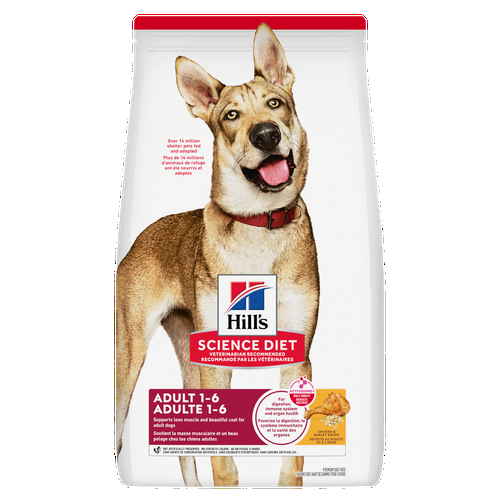
Supports healthy immune system, digestion, lean muscle & beautiful coat
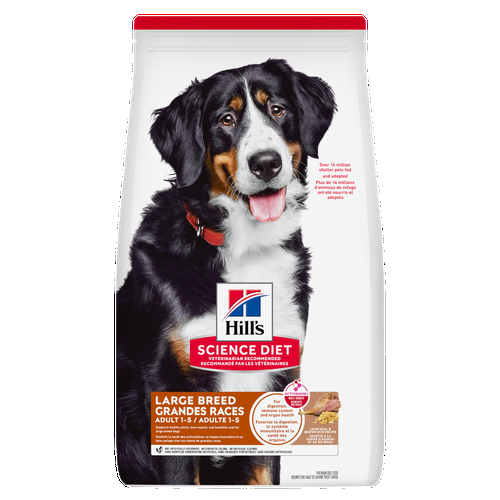
Supports healthy joints, immune system, digestion, lean muscle & beautiful coat
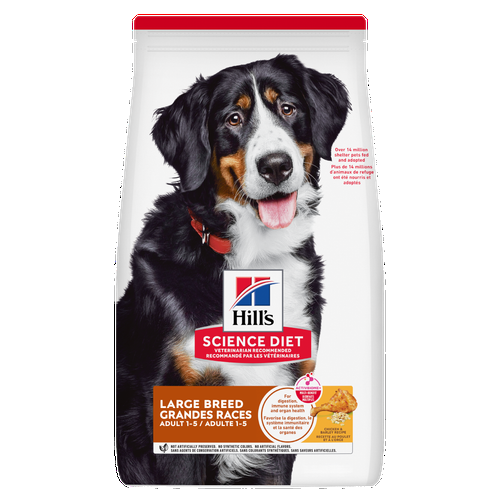
Supports healthy joints, immune system, digestion, lean muscle & beautiful coat
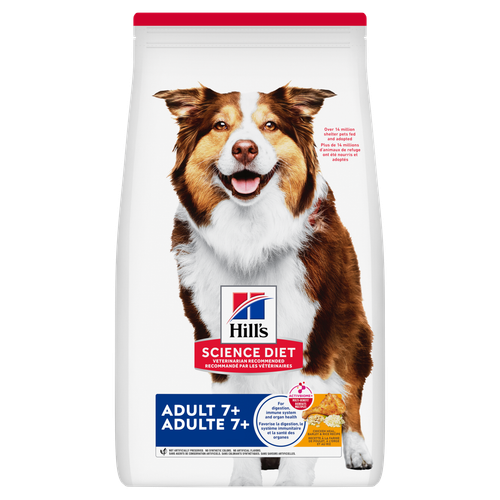
Supports energy level & beautiful coat. Helps keep immune system, heart & kidneys healthy
Related articles

Learn why nutrients like antioxidants & amino acids can help improve your pet's immune system, as well as top antioxidants to look for in pet food.

Discover how and where to store your dry, as well as canned, dog and cat food. Learn how to find the "best before" dates on all Hill's pet food packaging.

Compare Hill's Science Diet dog and cat food's calories against other pet food brands and AAFCO recommended maximum calorie count.

Learn what a pet's microbiome is, how it contributes to your pet's gut & overall health, and why nutrition is important in maintaining healthy microbiomes.

Put your pet on a diet without them knowing
Our low calorie formula helps you control your pet's weight. It's packed with high-quality protein for building lean muscles, and made with purposeful ingredients for a flavorful, nutritious meal. Clinically proven antioxidants, Vitamin C+E, help promote a healthy immune system.
Put your pet on a diet without them knowing
Our low calorie formula helps you control your pet's weight. It's packed with high-quality protein for building lean muscles, and made with purposeful ingredients for a flavorful, nutritious meal. Clinically proven antioxidants, Vitamin C+E, help promote a healthy immune system.

